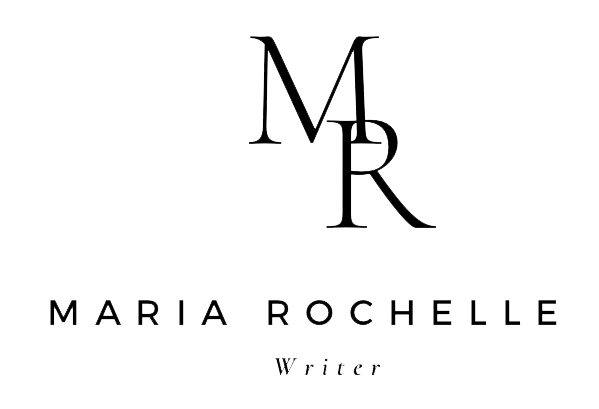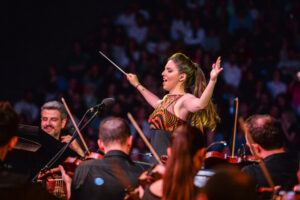
Esin Aydingoz is a composer and conductor, who a few years back made the courageous leap from her native country Turkey to attend Berklee College of Music in Boston, Massachusetts to pursue her passion. She, along with Quincy Jones and John Mayer, are some of the notable alumni of this outstanding institution for the study of music, theater and dance.
She recently toured with Disney Concert and AMP Worldwide as the conductor and music director for Coco Live to film concert North American Tour. Earlier, this year, Esin earned a nomination at the 2024 Grammy Awards this year for her cello arrangement of Rolling Stones’ Paint It Black. We talk about this in our chat along with her how young she when discovered her love of composing music. She shares with me three fun facts which I just love asking creatives for you never know what you’ll learn.
Introducing Esin…
What do you love about your life right now?
A lot of things that I have dreamt my whole life are coming true in surprising ways and at surprising times. I think the happiness that comes from that is deeper than any other kind of joy. I’m also really thankful that I get opportunities beyond just composing. I perform as a conductor and pianist as well. All these roles in music let me experience different kinds of fulfillment. Writing concert music is freeing, collaborating with filmmakers is thought-provoking, sharing adrenaline and excitement with an orchestra is exhilarating, and getting instant feedback from audiences is very rewarding and unreal. I only fully feel home when it all gets together, and I’m so grateful that 2023-2024 for me has been a combination of it all.
You left Turkey and moved to the United States to attend Berklee College of Music. From what I can tell from just listening to your music that you are pursuing one of your passions. What’s it like to pursue and work in a field that you love?
It’s very special, and being aware of how special it is is also very special. My entire community of friends are mostly artists, and we all live and die for what we do, but I know that there is a whole other community out there, which consists of people whose only motivation for work is money. I love that the driving force behind my motivation has been beyond that. I work to create something meaningful, connect with people at a deeper and inexplicable level, and build a legacy. I’m not even sure if I see it as “work”, I see it more as “the dream.”
Earlier this year, you were nominated for a Grammy for your cello arrangement for Rolling Stones’ Paint It Black, featured in Tim Burton’s Emmy Award-winning show Wednesday on Netflix. Your arrangement hit #1 on the Billboard Classical Charts with over 28 million Spotify plays. Congrats on your Grammy nomination and your success. By the way, I love it, and it’s on repeat on Pandora. How does it feel to be nominated for a Grammy?
Surreal. To get the love and appreciation of the general public is so touching and beautiful, but to get the highest creatives from the music industry to respect your work is a whole other level of validation. That’s something I’ve always wanted and I will always want more of. I remember writing Oscar/Grammy speeches with shampoo bottles in the shower as a kid. So to actually have gotten so close was mind-blowing. I should be honest, I sometimes still have trouble believing it. The day before the actual Grammy Awards, each nominee receives a Recording Academy nominee medal at a private nominee celebration. One of the hardest things I’ve ever done was to not cry like a baby in that moment – as for me that was the moment, when I finally started processing it was real. I basically kept it together for my makeup artist, Burcin Goksu, who put a lot of love into preparing me that day.
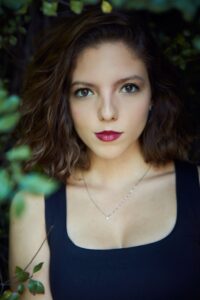
![]() From what I know about film composers, your way of storytelling is through your music. When did your journey of composing music begin? Also, was this your dream as a child to be a music conductor and film composer?
From what I know about film composers, your way of storytelling is through your music. When did your journey of composing music begin? Also, was this your dream as a child to be a music conductor and film composer?
My composing journey began at the age of 13 when my best friend wrote a song. She started playing piano after me, so I immediately had a “Wow! This is beautiful, but if she can do it, so can I” type of reaction. It’s thanks to her that I discovered this passion. My dream as a child was to work for Disney one day. I didn’t care too much about how exactly I could contribute to the Disney magic, I just wanted to be a part of spreading joy to the world. When I realized I could write music, I had the awakening that music is how I could contribute to the Disney legacy. I have photos of me conducting with balloon sticks in our living room, but I’ve always seen old male conductors, so I don’t think I ever realized I could become one. Even to this day, there aren’t many women conductors. Oftentimes I’m told I’m the first ever woman conductor that some people get to see – and I LOVE IT. I respect composers and conductors so much that I feel like I’m still trying to earn those titles even though I have done a substantial amount of professional work in both. It requires lifelong dedication to have the impact I hope to have.
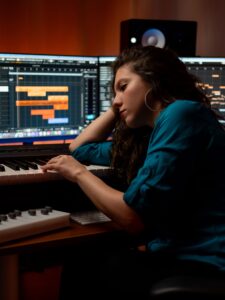
I’m curious, how many instruments can you play? Is it difficult to learn an instrument?
Professionally speaking, I can only play piano. Though, I used to play violin in my middle school orchestra, and sing in various choirs elementary school through college. I believe it’s easier for musicians to pick up other instruments and sound musical BUT each instrument presents different challenges when going from the beginner level to the intermediate, so obviously to *really* become proficient in it, one needs to spend hours practicing.
We all have experienced failure and I believe that failure is necessary in our lives. We can learn from them and grow. Do you have a favorite failure, and if so, why?
I don’t know about “favorite,” but yes – I do have an embarrassing failure that I still haven’t let go of – even after 8 years.
Playing piano and keyboard are slightly different, because if you are playing keys, and it’s for a performance that requires different instruments/sounds, there are two other layers of things to pay attention for:
- what instrument/sound you are using
- an additional pedal that controls your volume
I played keys for In The Heights, when we did a production of it at Berklee – and in a musical theatre show, all the keyboard sounds are programmed chronologically for you, so that for each time you need to change the sound, you press the same note, or button. These changes are pretty quick, so you don’t have time to look for them – it needs to be instant. Anyways, our Usnavi, Zaid Tabani, wrote a beautiful song to surprise the audience after the show – which was not a part of the keys programming – and I was supposed to manually go back to a soft synth pad sound. However, the applause was too distracting and beautiful that I completely forgot. So I came into Zaid’s song with the last patch of the show, which I believe was a loud and funny sounding accordion. Totally ruined his intro. I regret it to this day. You can *never* lose your focus and get into the “The show is over, we were great YAY” headspace until you are off stage.
One reason I love films is because of the film score, especially the ones from Braveheart and Gladiator. I was listening to your music as I was researching for our interview and enjoyed the different styles. Your musical abilities and talent are not limited to just one genre. You have composed music for romcoms, animations, video games, dramas, and romance. How do you prepare to compose for a film or TV show? What’s your process?
Each project presents a completely different world, and that’s what makes composing fun! I wouldn’t want to be known for just one thing. I’d like to score animation, epic and orchestral fantasies, heartbreaking dramas – I want to do it all! The key to preparation is really understanding the project and understanding the filmmakers’ vision. Once those two happen, then you dive right into composing – or do some research if you need to! Some films take place in a specific place or era that you might have to go in research mode before getting creative. I generally first watch the film without putting too much thought into music – but naturally I get some ideas – and then go right into writing themes and scoring. My actual creative process mostly starts by improvising on a grand piano or a string ensemble patch. Once I start liking my ideas, I then start recording them, mapping my ideas out, and building the arrangements as I go!
The music and film score to a film is just as important as the actors and screenwriter. The right music can enhance a film. What are your thoughts on that?
THANK YOU. Nobody realizes that haha! Only those who watch a film without music realize how awkward things feel without music. I agree wholeheartedly. Music has this magical power of drawing people in at a subconscious level and reminding them of their forgotten feelings, and memories. That’s why it’s so personal. As you said, it really “enhances” the viewing experience by intensifying our reactions. We sometimes use it to underline what’s already there, and sometimes use it to hint what’s not visually on the screen. For me it’s what makes me tear up vs. sob.
She Taught Love directed by Nate Edwards is a film that is coming out on Hulu on September 27th that you are the composer for. How did you become part of this feature film?
This movie was truly a gift from my manager, Peter Hackman. He found out about it and realized that I had already had a mutual project with one of the producers, and reached out to them. Soon after, I met with more producers. It was funny because I had my initial meeting with them the week that I got relocated to LA. I don’t think I had my workstation set up yet, I might have just sat on the floor and talked to them. (I normally love talking to filmmakers in a way that showcases my studio, because then I feel like I welcome them to my creative haven) Anyways, thankfully the producers liked me and introduced me to Nate. We really hit it off in our initial meeting. It was Nate’s first ever feature film, and he is also a musician, so he was very excited and curious about how a film composer works. Long story short, our initial zoom felt like a mix of a reunion with an old friend and How To Score A Feature Film 101 – it was awesome. I really hope he can become a life-long collaborator.
I watched a trailer for She Taught Love on YouTube, and from what I can tell, it’s a romantic drama about one character who has limited time and teaches a guy about love. I hope I’m right in the description of it. What was your process for composing the film?
Nate had a very specific vision about the score. He wanted it to feel a bit soul, a bit jazzy, a bit old-school but always cinematic and reflective of Hollywood magic. When you make a fusion of different genres, it’s almost always trial and error until you decide what elements to bring from each. I first wrote some themes for the lead characters. Some got approved, some got denied. We then went into scoring the film with the ones that were approved. We even had sessions where I was composing on Zoom while Nate was there with me virtually, giving me feedback on what he likes or doesn’t like or what instruments he feels closer towards. We kind of created the sound palette together on Zoom. Once we cracked the code of what works for him, it got easier. Later down the road, we also incorporated a lot of feedback from the producers. Overall it felt very collaborative. I never thought I’d say this, but I kind of miss receiving revision notes from Nate, because he always sent them to me in voice notes, and they always started with an almost singing type of “Good morniiiing! How is your day? I loved what you did but let’s try this this this” – just great energy!
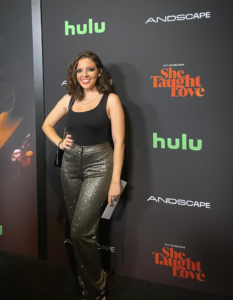
What are the joys and challenges of being a film composer and conductor?
Film Composer
Joy: Each project has a completely different world, and therefore a completely different musical vocabulary. I love it when I get to work on drastically different genres all at once! Getting to do animation, drama, documentary, and silent film all in one day makes me feel like a superhero, as if I’m living four lives, not one.
Challenge: Most composers are freelancers and they are juggling a million projects at the same time! We can never foresee the amount of revisions we will have to do for a project or how much a project’s delivery to us will be delayed, so handling a dozen timelines that keep changing could easily become a challenge.
Conductor
Joy: Getting to feel the excitement of a crowd without facing/seeing them is pretty epic! I also love it so much that even if you play the exact same thing over and over again, every performance has a different energy. Oh and the creative process as a composer is often a blur, so I feel like I make more memories as a conductor. Being mesmerized by different concert halls, laughing at mistakes we do at rehearsals, having pre-show dressing dance parties etc. Getting to live that whole experience is just the biggest gift anyone can ever have.
Challenge: You have to do A LOT of preparation beforehand in order to reach the self-confidence level that will basically become your armor! I see it as growth as all the preparation I do benefits me also as a composer, but it could be challenging for some. Also, I get such a “high” from conducting that once a show, or a tour is over, nothing makes sense for a while. I haven’t learned how to cope with that yet.
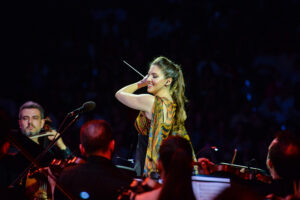
Is there any advice you would give to someone who wants to be a film composer and conductor?
The 10,000-hour rule is very real – so I would suggest that they say yes to any kind of opportunity regardless of pay, exposure, location, duration of the project, what-so-ever, that would help them observe or experience these roles first hand. I learned so much just by doing it or just by seeing/hearing others doing it.
Also, is there any advice that you wish someone gave you?
I still need advice on how to negotiate, be firm, and set boundaries. When you *LOVE* what you do, and when you let the world see that love, you start risking being taken advantage of: both creatively and financially… So I wish somebody had given me advice on how to be more reserved in a way that doesn’t jeopardize my warmth, which I think is half the reason why people come to me.
If you could have a gigantic billboard anywhere with anything on it, what message would you want to convey to millions? What would it say and why?
“Dream. Believe. Dare. Do.”
I think our dreams are what give us our “joie de vivre” – so it’s important to protect them at all costs. At the end of the day, regardless of where we are, who we’re with, who we love, who hurt us etc. etc. what keeps us going when we’re alone is essentially our dreams. I think the only way to protect them is to actively try to make them come true, so that we can have new ones! It’s like the fire that keeps us alive, so we have to keep that alive. Dreams are our now-purpose, soon-to-be legacies – so I want to remind millions of people to make time to dream, and then to show them the care they deserve.
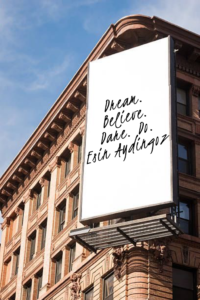
According to your site, your dedication is to making the world better through music. How does that happen in your eyes? I have to say for myself that it has helped me cope with grief and boost the joys in my life.
Everyone’s relationship to music is different. If I can spark someone’s creativity with my music and have them write a better essay, that’s a win. If I can remind them of someone they love, and have them re-connect with that person after years, that’s a win. If my music is the thing that makes someone who is at the verge of crying get vulnerable and let their guards down and start sobbing, that’s a win. If I can write music for a charity whose mission is important to me or others, that’s also a huge win! I just want to have a positive influence on as many people as I can in as many ways as I can. What gives me that power is music!
Esin, this is one of my favorite parts of the interview. Tell me three fun facts about you, and you can share a secret if you want to or not.
- I can pretty much fall asleep anytime, anywhere if I wanted to!
- I really want to professionally act one day. I have an evil plan of adding to my composer contracts that I have to at least be an extra in the movies that I score and experience the set life for 2-3 days. I think that could really contribute to the score too. Of course this could only apply for the movies that I get brought on earlier in the process, sometimes they find me during post-production, and then it’s too late – but I’d still score them! Oh and maybe this is the secret part: I weirdly want to play a villain – at least once. It would be fun getting to be mean without hurting anyone.
- I’m still waiting for that acceptance letter from Hogwarts.
Who are your biggest supporters?
Parents & husband take the #1 seat <3 Also some of my professors, friends, AWFC, and surprisingly some lovely strangers I’ve gotten to meet online and via touring!
Are you currently working on anything?
Always! A few short films, an orchestral re-imagining of some of my concert work for a brand new orchestra called “Turkish American Orchestra” which will have their inaugural concert on October 26th, writing new solo piano works for Dzintra Erliha, and remembering the Coco score as I will be touring again with it in October/November. Here is the link if your readers would like to join me on tour.
Describe yourself in one word.
Dreamer
I love ending the chat with a quote. Do you have a favorite quote or saying that has inspired and motivated you in your life that you can share with my readers?
Life begins at the end of your comfort zone.
Thank you for reading my interview with Esin! She’s inspiring and living her dream as a film composer and conductor. Please follow her on her social media.
